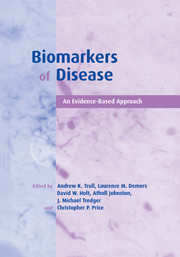Book contents
- Frontmatter
- Contents
- List of contributors
- Preface
- Part 1 Assessing and utilizing the diagnostic or prognostic power of biomarkers
- Part 2 Biomarkers of kidney disease and dysfunction
- Part 3 Biomarkers of bone disease and dysfunction
- Part 4 Biomarkers of liver disease and dysfunction
- 15 Biomarkers of hepatic disease
- 16 The immunogenetics of metabolic liver disease
- 17 Toxicogenetic markers of liver dysfunction
- 18 Prognosis and management of patients with acute liver failure
- 19 Biomarkers in artificial and bioartificial liver support
- 20 Prognostic markers in liver disease
- 21 Apoptosis: biomarkers and the key role of mitochondria
- 22 Liver regeneration: mechanisms and markers
- 23 Determinants of responses to viruses and self in liver disease
- 24 IL-6-type cytokines and signalling in inflammation
- Part 5 Biomarkers of gastrointestinal disease and dysfunction
- Part 6 Biomarkers in toxicology
- Part 7 Biomarkers of cardiovascular disease and dysfunction
- Part 8 Biomarkers of neurological disease and dysfunction
- Part 9 Biomarkers in transplantation
- Index
16 - The immunogenetics of metabolic liver disease
Published online by Cambridge University Press: 20 August 2009
- Frontmatter
- Contents
- List of contributors
- Preface
- Part 1 Assessing and utilizing the diagnostic or prognostic power of biomarkers
- Part 2 Biomarkers of kidney disease and dysfunction
- Part 3 Biomarkers of bone disease and dysfunction
- Part 4 Biomarkers of liver disease and dysfunction
- 15 Biomarkers of hepatic disease
- 16 The immunogenetics of metabolic liver disease
- 17 Toxicogenetic markers of liver dysfunction
- 18 Prognosis and management of patients with acute liver failure
- 19 Biomarkers in artificial and bioartificial liver support
- 20 Prognostic markers in liver disease
- 21 Apoptosis: biomarkers and the key role of mitochondria
- 22 Liver regeneration: mechanisms and markers
- 23 Determinants of responses to viruses and self in liver disease
- 24 IL-6-type cytokines and signalling in inflammation
- Part 5 Biomarkers of gastrointestinal disease and dysfunction
- Part 6 Biomarkers in toxicology
- Part 7 Biomarkers of cardiovascular disease and dysfunction
- Part 8 Biomarkers of neurological disease and dysfunction
- Part 9 Biomarkers in transplantation
- Index
Summary
Introduction
While most metabolic diseases result from single gene defects or the direct action of a toxic agent, there are circumstances where disordered metabolism or exposure to toxic agents gives rise to diseases which have a distinct immune basis. Such diseases are unlikely to arise from a single gene and fall into the category of ‘complex’ diseases, involving one or more genes as well as additional factors. The classical examples of immune-mediated metabolic disease are immune–allergic drug reactions (e.g. co-amoxiclav-induced hepatic cholestasis or minocyclin-induced autoimmune hepatitis) and metabolic diseases where repeated exposures induce chronic inflammation (e.g. alcoholic cirrhosis). The clinical outcome following acute toxic injury may also be influenced by the immune response (e.g. the outcome of acute liver failure following paracetamol overdose). Immune response genes may also play a role in determining the extent and severity of liver involvement in a number of single gene disorders including cystic fibrosis and α-1-antitrypsin deficiency.
The immune response genes do not themselves cause disease, but specific genes may be considered as risk factors with a potential to increase (i.e. susceptibility genes) or reduce (i.e. resistance genes) the risk of disease. Genes may also determine the rate of disease progression and/or the severity of symptoms (i.e. the disease phenotype). It must be remembered that these genes are often present in a large number of nonaffected individuals in the population and most are not defective under normal circumstances.
- Type
- Chapter
- Information
- Biomarkers of DiseaseAn Evidence-Based Approach, pp. 177 - 189Publisher: Cambridge University PressPrint publication year: 2002



